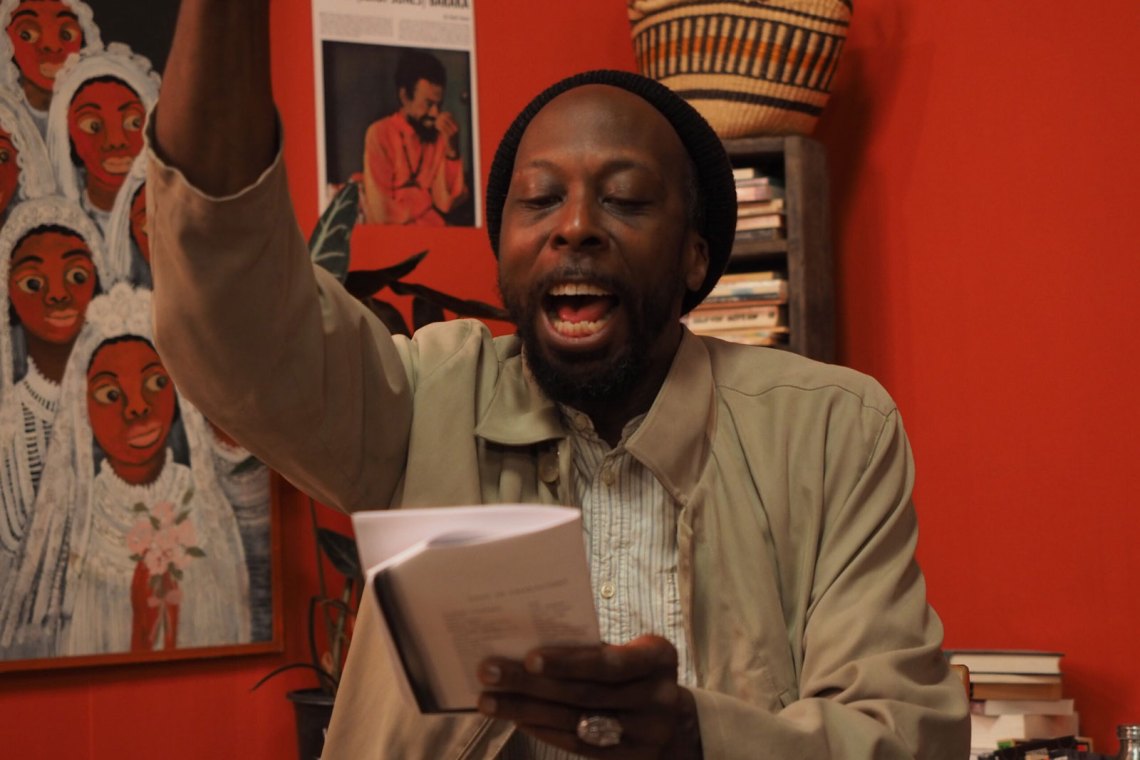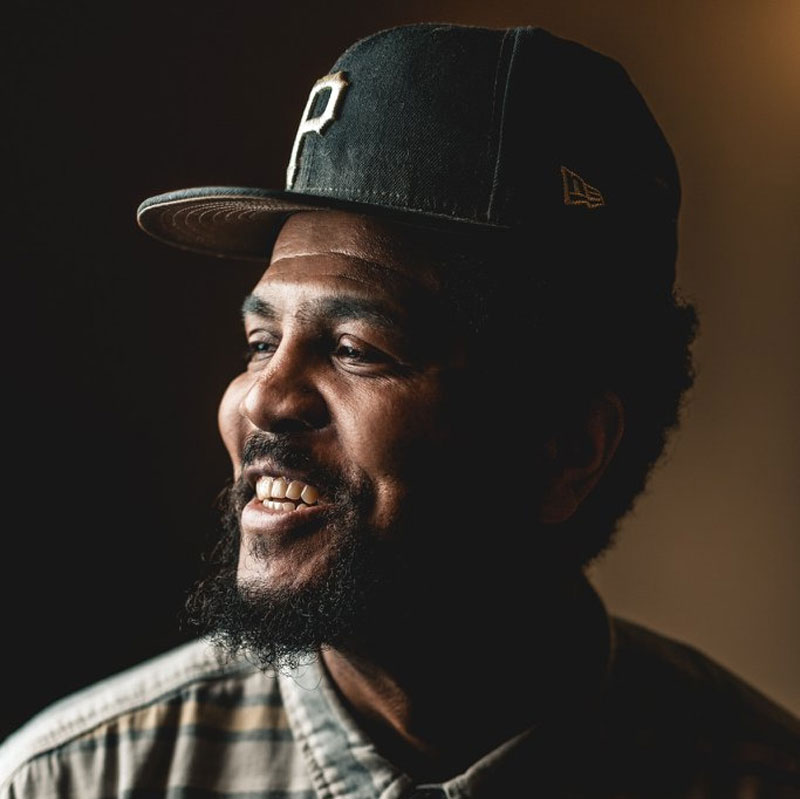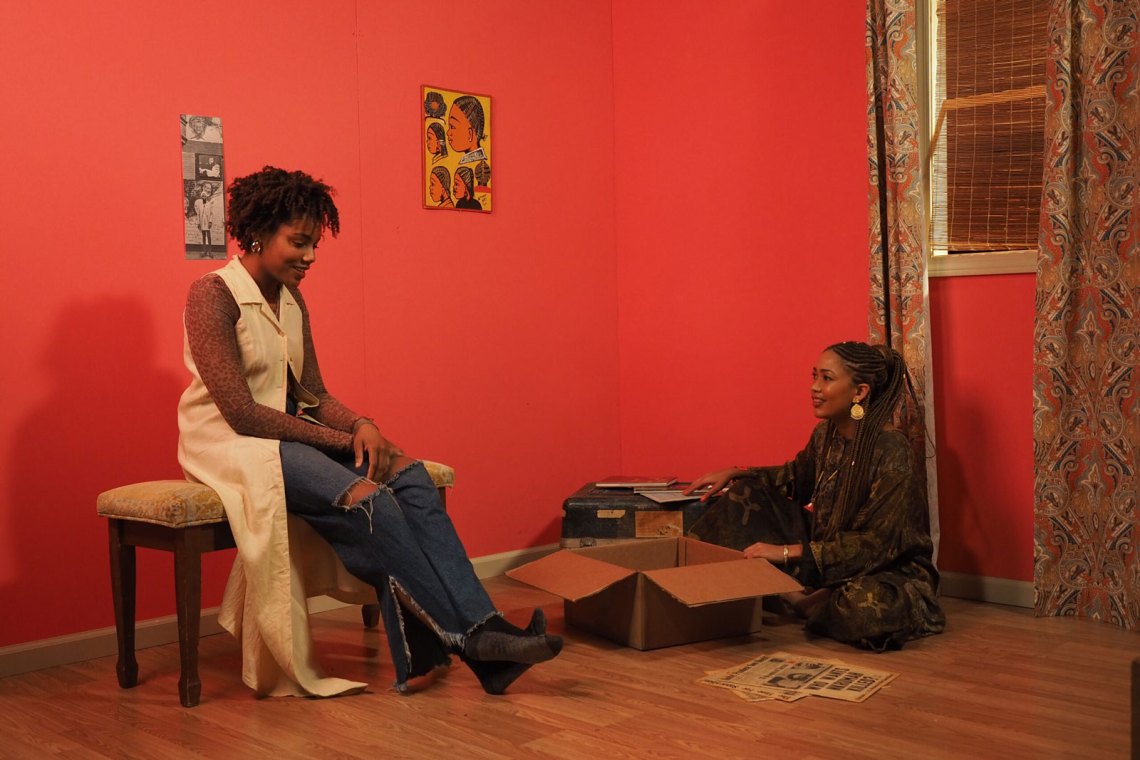Ephraim Asili’s The Inheritance opens with the protagonist, Julian (Eric Lockley), sorting through a large chest of books in the West Philadelphia house left to him by his grandmother. At the end of the film, in an extended take, he grudgingly cleans up the living room after a reading by the poet and performance artist Ursula Rucker. Between these two quiet, domestic scenes is a film that imagines a politics rooted in the everyday, comprised of big ideas and small, quotidian gestures. Julian and his girlfriend, Gwen (Nozipho Mclean), turn his grandmother’s house into a Black radical collective: the House of Ubuntu. In scenes that recall sitcoms for their studied artifice and breezy interpersonal comedy, the motley residents read revolutionary literature, play music, and hold consensus-building meetings. Their ideas are lofty, inspired by the anticapitalist writings of Julius Nyerere and Amiri Baraka, and their arguments petty, focused on whether to wear shoes inside the house or let strangers into the living room. Theory and praxis collide like flintstones in the group’s banal yet ambitious project—to live together.
Asili, born in Pennsylvania, describes the film as a “speculative re-enactment” of his own experiences of living in a Black Marxist collective in Philadelphia in the early 2000s. The filmmaker’s previous work consists of experimental shorts that explore the connections between Black American life and the African diaspora, using montage to bridge chasms of time and space. The Inheritance, his first feature and first work of (partial) fiction, involves a similar bricolage. Setting his narrative within a pop-art mise-en-scène that feels distinctly abstract, Asili weaves in archival footage and documentary segments of the members of the MOVE organization, a Philadelphia-based Black liberation group that was bombed by the police in 1985. Its presence fixes the House of Ubuntu within a political lineage, and offers an alternate example of what can happen when Black radicals create a commune. The stakes shift from arguing over food to being persecuted by the state.
This history is apparent from the carefully curated objects that make the house a hauntological haven of movement icons. Pictures of Stuart Hall and Shirley Chisholm adorn the walls, vinyl records by Margaret Walker and Elaine Brown line the shelves, and quotes by Kwame Nkrumah and Audre Lorde are scrawled on the chalkboard. Jean-Luc Godard’s La Chinoise (1968) looms over the film, both as a stylistic reference for Asili’s hybrid, mockumentary style and a literal prop—a poster—in the film’s set design. History is simultaneously spectral and solid in Asili’s vision, enduring as memory as well as artifact, and forcing the kinds of knotty encounters necessary to contrive a new present.
When I first saw The Inheritance last September at the New York Film Festival, a few months after global protests erupted following the murder of George Floyd by police, I found in the film an analogue for our communal grappling with the ways in which revolution unsettles the pace of daily life. On a morning in February, a few weeks before the film’s release in virtual cinemas, I spoke with Asili via Zoom about these themes and more. Our conversation has been edited and condensed.
Devika Girish: Your film depicts a community that attempts to live by consensus. Did you try a collective approach to filmmaking as well?
Ephraim Asili: It was a big culture shock, directing a feature film. I had never been in a studio situation before and had never directed a feature film. I generally don’t deal in narrative. For me, it was the first time working with a crew where there are thirty people just standing around watching you. Everyone’s getting paid, and so time is money.
At first, if I wanted to do a rewrite or had a question about a scene—for example, I’m writing dialogue for women, and I want to make sure it’s comfortable for them—my initial impulse was to say, let’s stop and try to work this out because I want to reach a consensus. What I quickly realized is that that was impossible due to time, especially when you’re working with union actors and shooting on film. So it became more of a writing challenge than a directing challenge to give it the aesthetic feel of collective life but not actually go through a process where everyone involved in the film is making the decisions. Fortunately, I had a lot of time with my actors prior to the shoot. I felt less like a dictator and more like a shepherd.
That’s something your film seems to get at, too—that collectivity and consensus are not necessarily the same. It’s not about reaching a middle ground but about everyone having some kind of ownership in the result.
Advertisement
That comes back to the idea of consensus as a subplot. As an audience, we’re going to judge this community on its ability to make a decision and execute a plan through consensus. But that’s not the be-all and end-all. Reaching consensus is also swallowing your pride or doing something you don’t necessarily want to with the hope that you’ll get something down the line. Or maybe you have other motivations or alliances that aren’t necessarily based on politics. Maybe just sticking together as a group is more important than the details of our individual politics. Those are some of the themes I wanted to explore.
As young people, we tend to be more about consensus, and we forget we’re in a community. Looking back [at my days in a collective], I probably didn’t need to freak out about the oat-milk issue or whatever it was.
In an interview with Artforum, you called your film a “remix” of Godard’s La Chinoise—neither homage nor critique, but a combination of both. How did that film become a reference for The Inheritance?
Godard’s always been one of my favorite filmmakers. I’ve seen other people make Godard-like work, and I’ve almost always read about how much of a failure it is, and I often agree! The failure comes from copying the looks and the style of a “master,” but not really interrogating the film form. So much of the art of the late Sixties and Seventies is considered didactic or speaking very directly to the issues of the time. I was trying to go back and revisit that art strictly on aesthetic terms.
Take it out of the politics. Do I like it as art? Since it’s so clear, so lucid, is there something that I can do with it? An artist like Emory Douglass, who was the minister of culture for the Black Panther Party, was putting out all these great posters—I thought of La Chinoise as being part of that tradition. So I wanted to do that but with different content.
My socio-economic-historic background is almost at the opposite end of the spectrum from Godard’s. I feel as if his film is very much informed by his class background, privilege, his education in the classics, etc. It’s a theme of the work, with the protagonists being at odds with the young, hip culture. I wanted to do something similar, where I’m allowing my background to seep into the characters in a direct way, as a reflection of who I am.
I love that in the film’s opening, Julian is pushing a heavy box of books, instantly conveying the weight of the ideas he’s inheriting from his grandmother. The House of Ubuntu is full of these objects that confront the characters with the material presence of history. Is that meant to be a counterpoint to La Chinoise and the ways in which its characters flatten revolutionary thought into accessories?
That’s a great contrast to bring up. When you’re born into privilege, in white culture, there’s always a choice of which way you want to go: Do you want to be liberal? Do you want to be conservative? Do you want to work for or against X, Y, and Z? You have the ability to sit back and choose, and no one would be surprised if you were staunchly conservative, as Godard once was in his youth, or give off the mixed signals some see him sending in his later years.
But for people of color who come from certain places, the situation is thrust upon you. It’s not like, “I’m going to take up being interested in my own wellbeing.” It’s a survival thing, not a luxury. There is a weight and a gravity to it because the protagonist of The Inheritance is isolated and alone, and he’s trying to build something from nothing, and that’s something he inherits. He inherits the gifts, but he also inherits the problems.
There’s no jumping in and jumping out, which is one of the things I love about La Chinoise. For the characters in that film, it’s their summer fancy. When the film ends, everything’s fine. I was trying to comment on that from the opposite end. The protagonist is right in the middle of something that wasn’t really a choice of his.
All the objects in the House of Ubuntu—the books, records, quotes—make up a distinctive revolutionary iconography that borrows from all over the world and from different periods of history. What kind of iconography were you going for when you designed the set?
Advertisement
First and foremost, there was a basic need to create the character of the grandmother without showing her. And then it was also about keeping enough subjectivity around it, so it’s not so much a specific syllabus or canon but rather the stuff that’s resonated with me and my life, which would make it just a little bit weird since people wouldn’t necessarily cross-reference the same things that I would. There was also the concern that the film be Pan-African in nature. The ideas come not just from African Americans but also continental Africa and the diaspora. So we see Stuart Hall and Patrice Lumumba popping up. That’s also true of the cast; there were people from different places.
How did the MOVE organization become a part of the film?
I knew that even if I didn’t put MOVE in the film at all, and it was a film about a Black collective dealing with radical politics in Philly, it would automatically invite that comparison. Also, in my real life, I was extremely close with MOVE, much closer than is represented in the film. When I was living in a collective, we were more or less basing our lifestyle on MOVE, and we lived about a block away from its headquarters.
When I was writing the film, I would show the cast documentaries about MOVE. It just so happened that as we got closer to shooting the film, [MOVE members] Mike Africa Sr. and Debbie Africa were released from prison. I called Mike Jr. on the phone and said, “I’m doing this film. I’m so excited your parents have gotten out. Would you want to come up and be in the film, performing what it was like back in the day?” They were super-excited to do it, so it was all very organic. But that particular sequence was not in my original script at all. The archival footage of MOVE was very much an afterthought. I started finding ways to incorporate it.
One of the most interesting things the film does is it shows what revolutionary ideas look like when they’re distilled into everyday life. The characters clash over the little things, like sharing space and food, but they also converge at the end for a performance that feels bigger than their day-to-day.
I wanted to [attempt] what I’ll describe as a more feminist approach to filmmaking—one in which brute force doesn’t have to be the solution to problems. Focusing on these smaller things, of people trying to get together and make a few decisions, and ending with achieving that, became a radical gesture in and of itself. I don’t like films depicting radicals that take the highlights and achievements of a person but don’t show any of the work, and you get the illusion that you have magical, charismatic people touched by God who are able to just make things happen. But these people go home and they fight over the same things everyone fights over. I wanted to make sure that that was in the film. I wanted to make this type of activity seem very everyday, and not as if it was a reserved space for special individuals.
When we tackle something like climate change, it’s going to require vast global cooperation and for everyone to make all sorts of uncomfortable compromises. My fear, my anxiety, that I’m grappling with in this film, is that if we’re not able to struggle with the domestic things, I can’t see how we’re going to figure out the bigger issues. All these struggles are one and the same. We get caught up in protest culture, which is great, but we’re often left with the question: What next? I didn’t want to make a film just depicting protests. What do you do after that?
You clean up.
You start over. You keep doing it. And that’s good enough. You survived, and you were sustained. That’s what I was going for.




